Fat is essential to cooking and baking, and there are many different types used in the culinary world. They each have their specific uses and qualities and they each impart specific characteristics to dishes.
It is not essential to own every type of cooking oil out there but it is helpful to know the options so that in case you cannot find one type of oil called for in a recipe, you can successfully find a workable substitute for it.
Rapeseed oil is oil that is produced from the rape plant. The type used for culinary purposes is known as Canola oil. It is a neutral flavored oil with a high smoke point that is suitable for sauteing, frying, and even for use in cold dishes like salad dressings.
It is versatile and is good to have in the kitchen. But what if you have run out, cannot find it or want to explore other options?
What are the best substitutes for rapeseed oil?
Substitutes for Rapeseed Oil
The best substitutes for rapeseed oil include olive oil, sunflower oil, safflower oil, grapeseed oil, avocado oil, vegetable oil, peanut oil, and coconut oil. Depending on the dish, some of these substitutes work better than others but in general, they may be used in place of rapeseed oil.
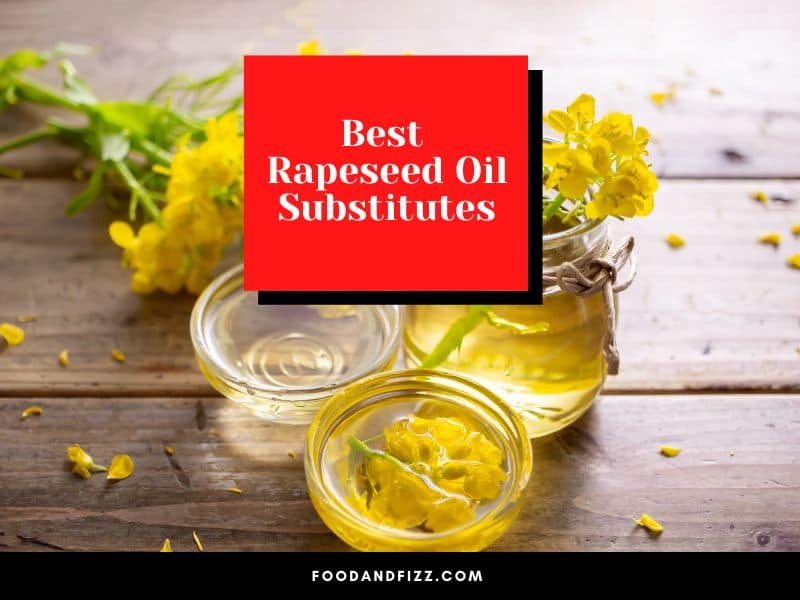
8 Best Rapeseed Oil Substitutes
Rapeseed oil is a versatile, flavorless oil that can be used for frying, sauteing, and baking, and can be used in cold applications like salad dressings. It has a neutral flavor which makes it easy to use in a variety of recipes without adding tastes that can overpower a dish.
If you do not have it on hand or want to explore other substitutes, there are a few things you can use in place of it. We’ll look at those below.
1. Olive Oil
An integral part of Mediterranean cooking, olive oil is considered by many as the healthiest oil. It offers many different types of flavor profiles that can be adapted to enhance your recipes, which makes it one of the most favored oils to use in cooking. It is rich in antioxidants and monounsaturated fats which promote heart health.
It can be used in place of rapeseed oil for salad dressings, sauces, and light sauteing, or in uses where your dish may benefit from the flavor of the olive oil.
There is a common notion that olive oil isn’t suitable for high-heat cooking because of its lower smoke point compared to other oils.
This is because heating oil beyond its smoke point can make it unstable and cause the formation of compounds and free radicals that can cause harm to our health.
However, recent studies have found that olive oil is actually pretty heat stable, and that smoke point is not the most reliable indicator of an oil’s stability. This means that olive oil is heat stable, and may be used for high-heat cooking similar to rapeseed oil.
The one thing to note though is that the distinct, delicate flavor notes of olive oil disappear with heating, so using an expensive bottle of olive oil will not make much of a flavor difference in your dish when it is seared in high heat compared to when you use a generic, cheaper bottle.
In my opinion, it is best to use that expensive bottle you bought from that vineyard in Italy for dishes where you will actually taste its unique flavor, not for random deep frying or searing of dishes when flavor of the oil will actually not matter as much.
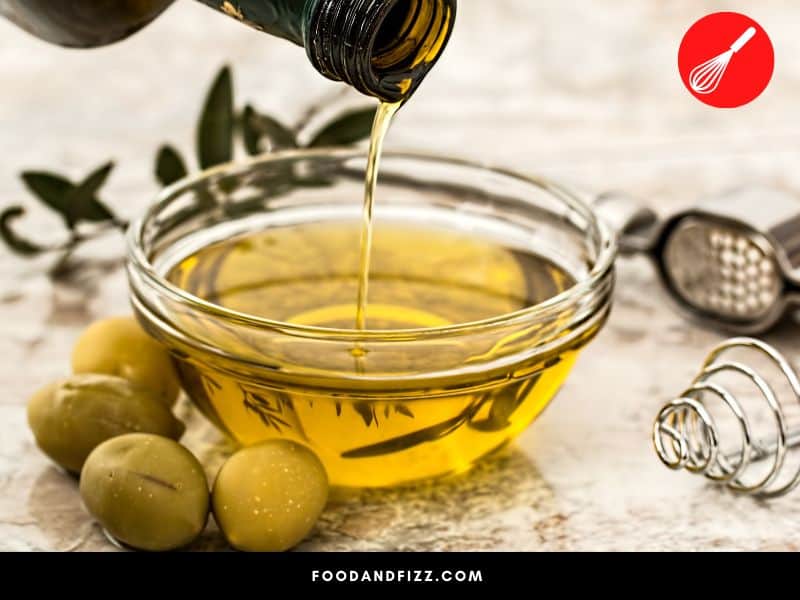
2. Sunflower Oil
Sunflower oil is oil from the sunflower plant, processed from its pressed seeds. It is clear and has a neutral flavor if it is the refined kind, with a high smoke point of about 450 °F.
It can be substituted for rapeseed oil in recipes. The cold-pressed or unrefined type of sunflower oil has a slightly nutty and buttery taste, so it is important to keep this in mind as it may alter the flavor of your dish slightly.
Sunflower oil is rich in linoleic acid and similar to olive oil, also has beneficial fatty acids, vitamins, and minerals, although olive oil is generally healthier.
3. Safflower Oil
Similar to but not to be confused with sunflower oil, safflower oil is derived from the safflower plant. It is neutral and flavorless like rapeseed oil so it can be used as a substitute in recipes where a mild or neutral oil is required.
It comes in two varieties – high linoleic or high oleic, with the latter one being the more common one for culinary use in the U.S.
The high oleic variety has a higher smoke point than the refined and unrefined varieties, so it is important to make note of this depending on your recipe.
4. Grapeseed Oil
Grapeseed oil, as the name implies, is derived from the seeds of grapes. Certain varieties of grapes have seeds that when pressed, produce oil that’s neutral tasting and can be used in a variety of recipes.
Grapeseed oil is a byproduct of making wine, and most grapeseed oils produced come from either Switzerland, Italy, or France.
Its neutral flavor makes it a great substitute for rapeseed oil in recipes and is best used for dishes where the flavor of whatever it is you are making can shine.
It is light green in color and is popular with chefs as an alternative to olive oil in salad dressings, as it is cheaper than olive oil. Its high smoke point of 421 °F, makes it suitable to be used for high-heat cooking.
It is a great substitute for rapeseed oil both in cold applications and high-heat cooking.
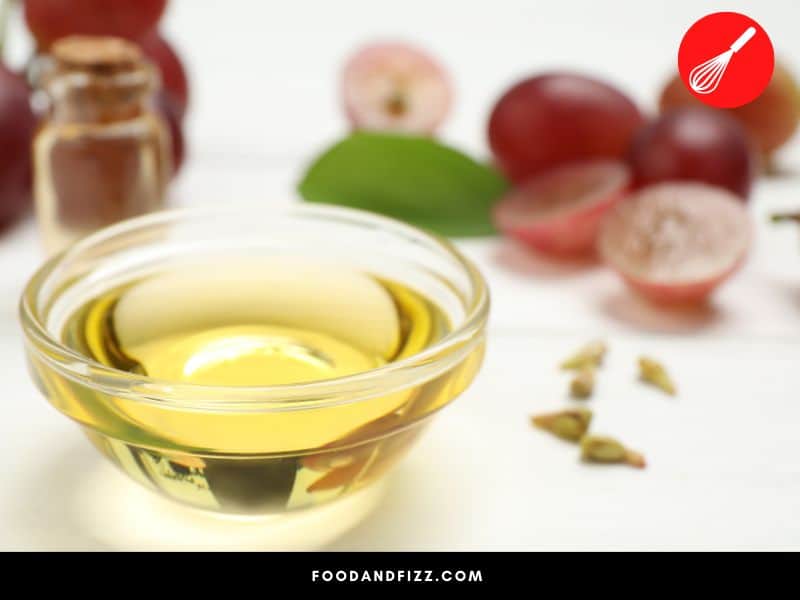
5. Avocado Oil
Avocado oil is produced from the actual avocado fruit. Like olive oil, it contains healthy fats, vitamins, and minerals that are good for the heart and support overall health.
It is said to lower cholesterol, improve blood pressure and contain compounds that fight cancer. It has a very high smoke point, perhaps the highest of all plant-based oils at over 500 °F.
Usually, unrefined oils have a much lower smoke point than refined ones but in the case of avocado oil, even the unrefined variety has a high smoke point of around 480°F, still higher than other cooking oils.
Avocado oil is a great substitute for rapeseed oil in all types of cooking. The refined version is clear and neutral in flavor, while the refined version has a buttery taste with a hint of avocado taste.
The disadvantage of using avocado oil is that it can be very expensive and can be difficult to find. But if you have it in your pantry, you can definitely use it as a substitute for rapeseed oil.
6. Vegetable Oil
Vegetable oil is a generic term used to refer to oils produced from plants and seeds, like soybean, corn, palm, cottonseed oil, and others. They are mild and neutral-tasting, which makes them excellent substitutes for rapeseed oil.
Most experts agree though, that it isn’t necessarily the healthiest oils to use, despite the fact that they are vegetable oils.
Most of these oils are highly processed and hydrogenated, so it is also best to exercise caution in consuming them too much, as with anything. In terms of needing a neutral-tasting oil to substitute for rapeseed oil though, vegetable oils normally would be suitable.
7. Peanut Oil
Peanut oil is extracted from peanuts. The refined type has a high smoke point of 450 °F, which means it is a popular choice for frying and other high-heat cooking methods.
It is a good substitute for rapeseed oil as it also has a mild and neutral flavor, and won’t interfere with the flavor of your dish. Like most oils, it also comes in an unrefined variety. Unrefined peanut oil has a nutty taste and has a lower smoke point.
Be careful with peanut oil though, as some people can have potentially life-threatening reactions if they are allergic to peanuts. The refined variety has allergy-causing proteins removed which may be a safer option but the unrefined variety has the proteins intact. However, it’s best to just opt for a different substitute if you are unsure.
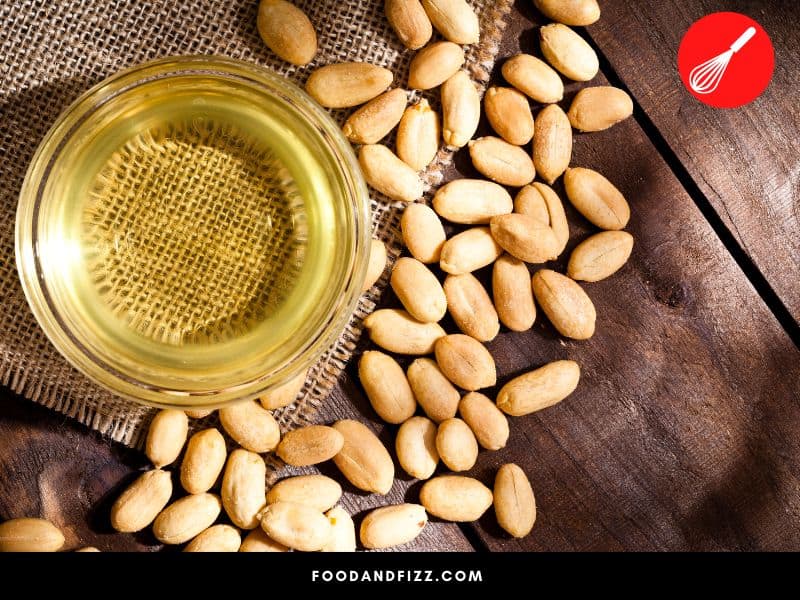
8. Coconut Oil
And finally, coconut oil. If you find that you are out of rapeseed oil, refined coconut oil is a great substitute. Coconut oil is anti-inflammatory, anti-bacterial, and has a ton of health benefits. It contains lauric acid, which helps with viral infections. It is one of the healthier fats, though of course it is always best to practice moderation in its consumption.
The refined variety is neutral tasting and can be used in most cooking applications as you would any other neutral oil.
The unrefined variety though has a strong coconut taste, which is something you should factor in if using it for things like salads or sauces. Also, coconut oil turns solid at colder temperatures, so it may not be ideal for colder applications.
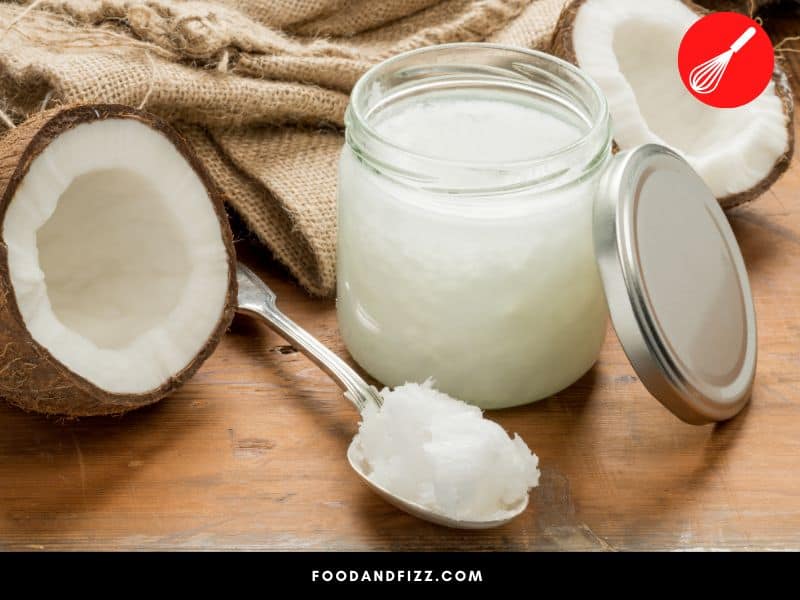
What Is Rapeseed Oil?
Rapeseed oil is oil that is produced from the rape plant seeds. The rape plant is a flowering plant that is part of what is called the Brassicaceae family of plants.
This family of plants includes kale, mustard, and cabbage. Known also as oilseed rape, this type of plant was found to be rich in oil, though it wasn’t always historically touted as pleasant or safe to eat.
Rapeseed oil comes in two forms: edible and industrial. Rapeseed oil that is edible and used in the kitchen is also known as Canola oil. Industrial rapeseed oil is used in the automotive industry as lubricants and hydraulic fluids and in manufacturing plastics.
Short History of Canola Oil
Rapeseed oil has been used in cooking for a long time but it wasn’t always touted as safe to eat.
This is due to the presence of two compounds in the oil – erucic acid and glucosinolates, which can be harmful when consumed in large amounts. Erucic acid has been found to cause damage to the heart of animals and may cause the same in humans, and glucosinolates are responsible for the bitter flavor of the plant which acts as its natural defense against pathogens and herbivores.
This challenged scientists to develop and modify the original plant to decrease the levels of erucic acid and glucosinolates in them, making them safer and more pleasant to use as a culinary oil.
Because of this, In 1979, a new cultivar of rapeseed was born in Canada. Known as Canola, this type of rapeseed oil boasted very low levels of erucic acid and glucosinolates, which made it more appealing to use in cooking, and much, much safer to consume.
Is Rapeseed Oil The Same As Canola Oil?
Rapeseed oil pertains to both the oil used in the chemical and manufacturing industries and the culinary oil used for frying and salad dressing.
It would be potentially disastrous to mix up the two so in general, culinary rapeseed is marketed as Canola oil. In culinary use, the two terms are interchangeable, although they are technically from two different plants, albeit similar. Canola is a cultivar or a type of rape seed plant with low erucic acid and glucosinolates.
Conclusion to Rapeseed Oil Substitutes
Culinary rapeseed oil or its variant, Canola oil, can easily be found in grocery stores but if you find that you cannot source any, or else would just like to explore other alternatives, there are many other oils you can use such as olive oil, sunflower oil, safflower oil, grapeseed oil, avocado oil, vegetable oil, peanut oil, and coconut oil.
They are all oils that are mild and neutral flavored and are heat stable like rapeseed oil. The best type of oil substitute to use depends on your specific recipe, your budget, and availability.
Frequently Asked Questions to Rapeseed Oil Substitutes
Is Rapeseed Oil the Same As Canola Oil?
Canola oil is a cultivar of the rapeseed plant. They are similar except Canola is genetically modified to reduce the content of potentially harmful and offputting compounds. In culinary use they are interchangeable.
Is Rapeseed Oil Healthy?
Rapeseed oil is low in saturated fat and high in oleic acid which means it can be part of a healthy diet. However, as with all things, rapeseed oil must be consumed in moderation in conjunction with a healthy diet and lifestyle.
Is Canola Oil Genetically Modified?
Most of the canola oil that we use comes from genetically modified plants, as Canola to begin with isn’t a natural plant. Thus, most Canola oil is considered a genetically modified food.

